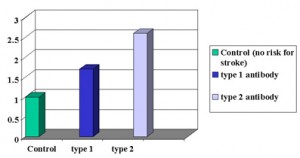Gum disease is common, particularly in the Western civilization. It has been known for a number of years that heart attacks are associated with chronic gum infections, but whether or not strokes would also be more common in these patients was not known for certain. The purpose of a University of Helsinki study by Dr. Pussinen was to see whether patients with periodontal gum disease were objectively more at risk to develop a stroke over a period of time. Blood samples of 6950 people aged 45 to 64 were collected between 1973 to 1976. The patients were followed for 13 years and 173 developed a stroke. Blood samples for antibody studies had been taken at the beginning of the study. Two types of antibody tests were done in order to check out whether or not the body’s immune system had reacted to two of the typical pathogens that are associated with bad and chronic gum disease.
Other studies had shown earlier that the pathogens Actinobacillus actinomycetemcomitans (in the illustration above called “type 1”) and Porphyromonas gingivalis (above called “type 2”) are associated with the initiation of hardening of arteries (atheromatous plaque formation).
Dr. Pussinen and his group looked at indiviuals that were free of stroke or heart disease at the baseline. Among those individuals who were positive for the type 1 antibody and after adjusting for heart disease risk factors, there was a 1.7-fold risk of developing a stroke (shown as dark blue bar above). When type 2 antibody titers were tested among these stroke patients, the probability of finding a positive type 2 test was 2.6-fold higher than in appropriate controls. The authors concluded that aggressive forms of periodontitis (=bad gum disease) are an independent risk factor to develop a stroke.
| Stroke risk in patients with gum disease compared to controls without gum disease (see text for details) |
Comments: It has been known, based on the original research from Switzerland several decades ago, that tooth decay can be prevented or slowed down by brushing our teeth following meals and in particular after sugar consumption.
Regular flossing once per day has been shown in more recent years to counteract gum disease (periodontitis). Only recently has it been shown that heart disease is directly related to infection of atheromatous plaques with Chlamydia pneumoniae and the other two pathogens mentioned above. It is here that we can make a big difference to our health. How do we prevent periodontal disease? By brushing and flossing our teeth daily. It is that simple. Well, not quite. There is one other thing: We need to cut down the amounts of sugar and starch we consume every day as this provides the micro-chemical climate in the mouth for these bacteria to multiply and this is what we want to change. This will tip the balance in our favor: healthy teeth, healthy gums, healthy blood vessels, hearts and intact brains.
To learn more about this topic, here are more links regarding gingivitis and periodontal disease.
Reference: Dr. Pussinen et al., September issue of Stroke (Stroke 2004;35:2020-2023)
Last edited Oct. 27, 2014







